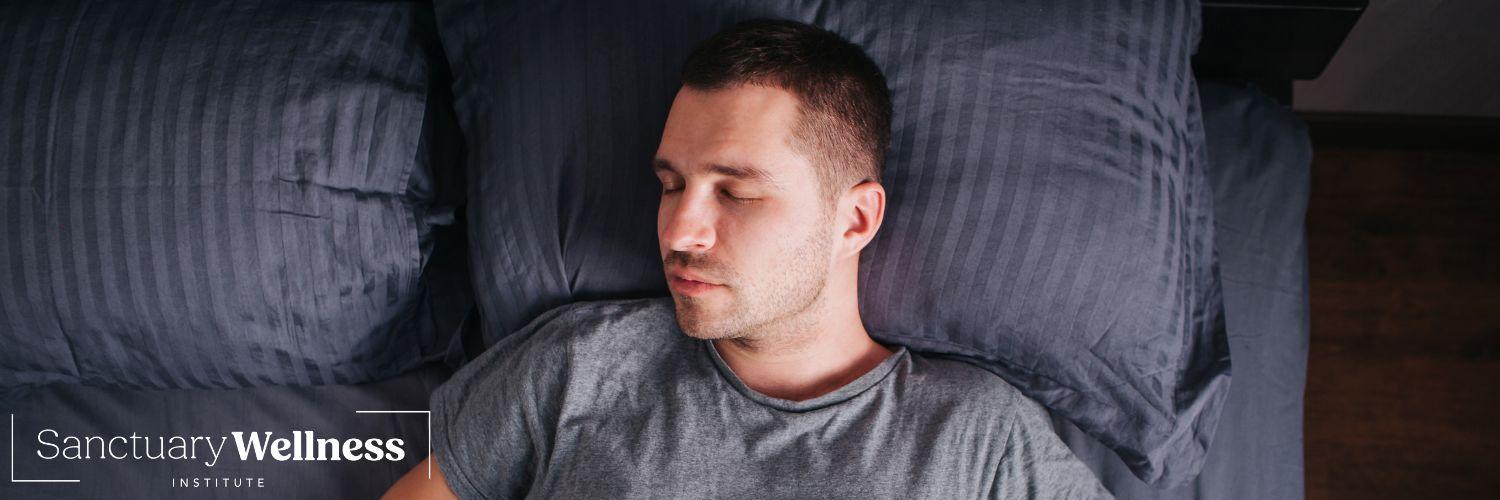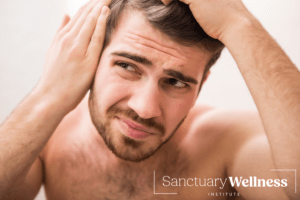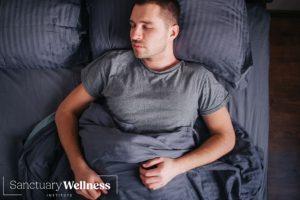- Nicholas DiBella
- Published: June 18, 2025
- Fact-checked by Dr. Desiree Granados

Sleep and testosterone are closely connected. Most people know that getting good rest is important for overall health, but not everyone realizes just how critical sleep is for hormone production, especially testosterone.
At the same time, low testosterone levels can interfere with sleep quality. This article explores the complex relationship between testosterone and sleep, how one affects the other, and what you can do to support both.
How Are Testosterone and Sleep Connected?
Testosterone is primarily produced during sleep, especially during REM and deep sleep stages. The body follows a natural circadian rhythm, which means that testosterone levels fluctuate throughout the day and are significantly influenced by nighttime rest.
The majority of testosterone release happens in the early stages of sleep, peaking during REM sleep. As a result, sleep is not just restful; it’s biologically essential for hormone balance.
Studies have shown that men who sleep fewer hours at night tend to have lower levels of testosterone during the day. A single night of poor sleep may not have long-term effects, but consistent, quality sleep is crucial for maintaining healthy hormone levels.
Wondering if you might have low testosterone? Take our quiz to find out!
Can Low Testosterone Cause Sleep Problems?
Yes, low testosterone can contribute to sleep disturbances. Men with reduced testosterone often report difficulty falling asleep, staying asleep, or waking up feeling unrefreshed. This can lead to symptoms like daytime fatigue, irritability, and difficulty concentrating.
Low testosterone may also be linked to certain sleep disorders, including insomnia, a condition marked by chronic trouble sleeping. The hormonal imbalance can disrupt the body’s ability to regulate sleep cycles, making rest feel shallow or fragmented.
Does Poor Sleep Decrease Testosterone Levels?
The relationship goes both ways. Poor sleep can significantly lower testosterone levels, especially when sleep deprivation becomes chronic. Research suggests that even just one week of sleep restriction (less than five hours per night) can result in a noticeable drop in testosterone.
This is because the body has fewer opportunities during sleep to produce the hormone, which may lead to ongoing fatigue, lower libido, and muscle loss (all symptoms commonly associated with low testosterone). Over time, a cycle develops where poor sleep leads to low testosterone, and low testosterone further impairs sleep, perpetuating the problem.
Sleep Disorders That Affect Testosterone
Several sleep disorders can directly or indirectly lower testosterone levels:
Insomnia
Chronic insomnia prevents the body from entering deep, restorative stages of sleep—where testosterone production is most active. Even if you spend time in bed, a lack of quality sleep can blunt hormone output.
Sleep Apnea
Obstructive sleep apnea is another major disruptor. This condition, characterized by repeated pauses in breathing during sleep, is more common in men and in those with lower testosterone levels. The frequent awakenings caused by apnea drastically reduce the amount of deep and REM sleep, cutting into the time when testosterone would normally be produced.
Men with untreated sleep apnea often report symptoms like fatigue, mood changes, and reduced libido. These symptoms also overlap with low testosterone.
Improving Sleep to Support Healthy Testosterone Levels
Addressing sleep issues is a key step in maintaining or restoring healthy testosterone levels. Here are some strategies:
- Maintain a consistent sleep schedule: Go to bed and wake up at the same time every day—even on weekends.
- Create a sleep-friendly environment: Keep your bedroom dark, quiet, and cool.
- Limit screen time before bed: The blue light from phones and tablets can interfere with melatonin production and delay sleep onset.
- Avoid stimulants and alcohol before bed: Caffeine and alcohol can fragment sleep or prevent you from reaching deeper stages of rest. (In fact, overconsumption of alcohol can negatively impact testosterone levels.)
- Seek medical help: If you suspect you have sleep apnea or another disorder, speak with a healthcare provider. They may recommend a sleep study or additional testing.
In some cases, testosterone replacement therapy (TRT) might be a helpful solution if low hormone levels are significantly impacting your quality of life. However, it’s essential to treat both the sleep issues and hormonal imbalances together to break the cycle.
Conclusion
Sleep and testosterone are closely connected. Low testosterone can interfere with your ability to sleep well, and sleep deprivation can, in turn, lower your testosterone levels. Insomnia and sleep apnea are common culprits that affect both sleep quality and hormone production.
If you’re experiencing symptoms of poor sleep or low testosterone, it’s important to evaluate both factors. Making changes to your sleep habits and addressing underlying health issues can go a long way toward restoring balance and improving your overall well-being.
At The Sanctuary Wellness Institute, we’re passionate about helping people feel their best and take control of their health. Our men’s health services include testosterone replacement therapy (TRT), which can support better sleep for men experiencing low testosterone.
For other sleep-related issues, we prescribe GLP-1 medications, now FDA-approved as a treatment for sleep apnea. We also proudly offer medical marijuana certification for individuals interested in using medical cannabis to help manage sleep disorders like insomnia and related conditions like anxiety and PTSD. Reach out today to explore which therapies might be the best fit for you.
How we reviewed this article:
- Joshua Feriante, John F. Araujo (2023). Physiology, REM Sleep
https://www.ncbi.nlm.nih.gov/books/NBK531454/ - Rachel Leproult, Eve Van Cauter (2015). Effect of 1 Week of Sleep Restriction on Testosterone Levels in Young Healthy MenFREE
https://pmc.ncbi.nlm.nih.gov/articles/PMC4445839/ - Susan McNamara, Benjamin C. Spurling, Pradeep C. Bollu (2025). Chronic Insomnia
https://www.ncbi.nlm.nih.gov/books/NBK526136/ - Jennifer M. Slowik, Abdulghani Sankari, Jacob F. Collen (2025). Obstructive Sleep Apnea
https://www.ncbi.nlm.nih.gov/books/NBK459252/
Current Version
June 18, 2025
Written By
Nicholas DiBella
Fact-checked By
Dr. Desiree Granados
Editorial Process
Our Editorial Process

Nicholas DiBella received his psychology degree from West Chester University of Pennsylvania and has been writing content for the Sanctuary Wellness Institute since 2023. He is passionate about all things health & wellness.







